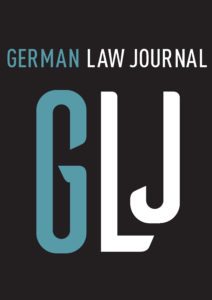 Abstract by German Law Journal
Abstract by German Law Journal :
The law on state-church relations is no longer exclusively a national concern of the EU Member States. Despite supposedly strict neutrality clauses in the primary law of the EU and rigid statements—
inter alia—by the German Federal Constitutional Court, it is safe to assume the formation of a supranational EU law on religion, which also touches upon the status of the churches and religious associations. This becomes obvious when state-church relations in Europe are reconstructed as a double conflict of laws that comprises interlocked conflicts between ecclesiastical law and worldly law, as well as between EU law and national law. Within the triangular relationship of these different legal spheres, EU law steers state-church relations towards the non-discrimination principle. The controversy in German law on religion between the proponents of a collective, institutionalist understanding (classic “Staatskirchenrecht”) and advocates of a rather fundamental rights-centered, individualist reading of the Constitution (“Religionsverfassungsrecht”) hence needs to be reconsidered. EU law calls for including yet a third paradigm into the debate: Equality.

 Abstract by German Law Journal :
The law on state-church relations is no longer exclusively a national concern of the EU Member States. Despite supposedly strict neutrality clauses in the primary law of the EU and rigid statements—inter alia—by the German Federal Constitutional Court, it is safe to assume the formation of a supranational EU law on religion, which also touches upon the status of the churches and religious associations. This becomes obvious when state-church relations in Europe are reconstructed as a double conflict of laws that comprises interlocked conflicts between ecclesiastical law and worldly law, as well as between EU law and national law. Within the triangular relationship of these different legal spheres, EU law steers state-church relations towards the non-discrimination principle. The controversy in German law on religion between the proponents of a collective, institutionalist understanding (classic “Staatskirchenrecht”) and advocates of a rather fundamental rights-centered, individualist reading of the Constitution (“Religionsverfassungsrecht”) hence needs to be reconsidered. EU law calls for including yet a third paradigm into the debate: Equality.
Abstract by German Law Journal :
The law on state-church relations is no longer exclusively a national concern of the EU Member States. Despite supposedly strict neutrality clauses in the primary law of the EU and rigid statements—inter alia—by the German Federal Constitutional Court, it is safe to assume the formation of a supranational EU law on religion, which also touches upon the status of the churches and religious associations. This becomes obvious when state-church relations in Europe are reconstructed as a double conflict of laws that comprises interlocked conflicts between ecclesiastical law and worldly law, as well as between EU law and national law. Within the triangular relationship of these different legal spheres, EU law steers state-church relations towards the non-discrimination principle. The controversy in German law on religion between the proponents of a collective, institutionalist understanding (classic “Staatskirchenrecht”) and advocates of a rather fundamental rights-centered, individualist reading of the Constitution (“Religionsverfassungsrecht”) hence needs to be reconsidered. EU law calls for including yet a third paradigm into the debate: Equality.
